Module 4 Life in the future>Unit 3 Language in use课件(共34张PPT)
文档属性
| 名称 | Module 4 Life in the future>Unit 3 Language in use课件(共34张PPT) |

|
|
| 格式 | ppt | ||
| 文件大小 | 5.8MB | ||
| 资源类型 | 教案 | ||
| 版本资源 | 外研版 | ||
| 科目 | 英语 | ||
| 更新时间 | 2022-07-06 21:55:00 | ||
图片预览

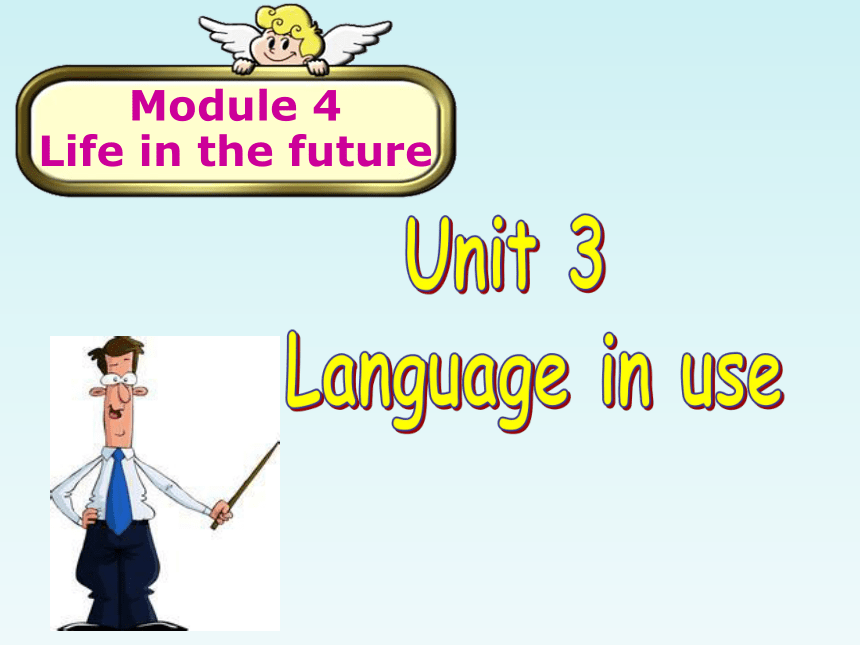

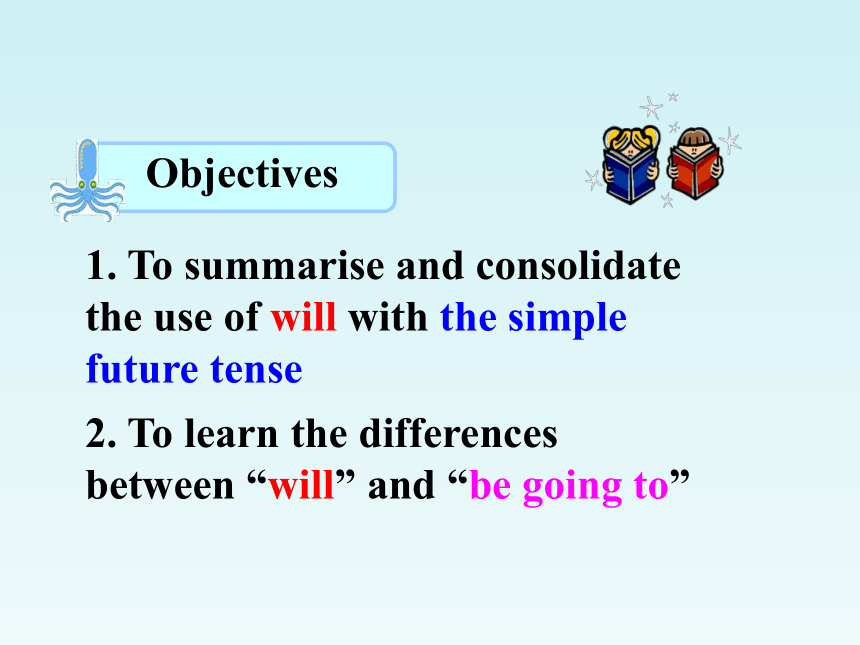
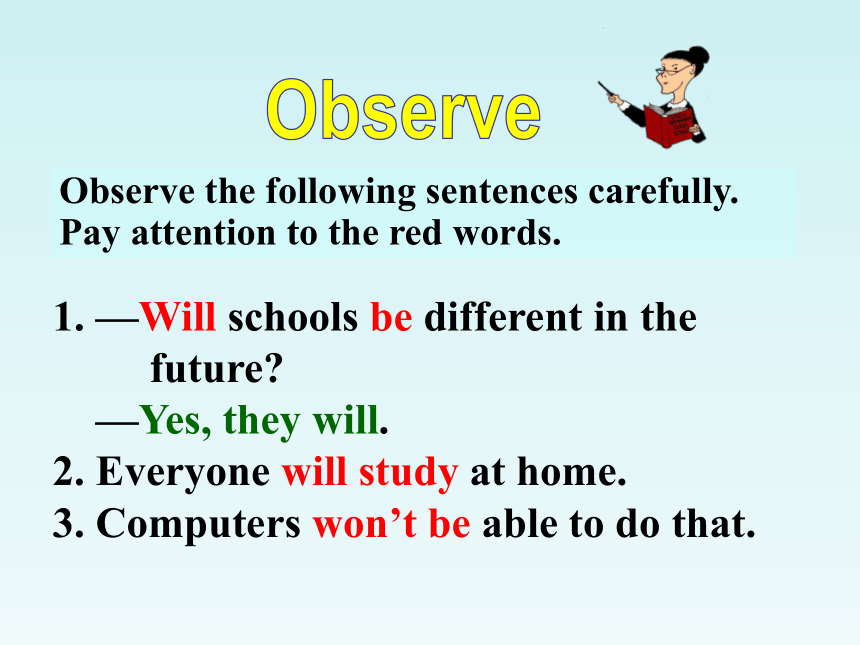
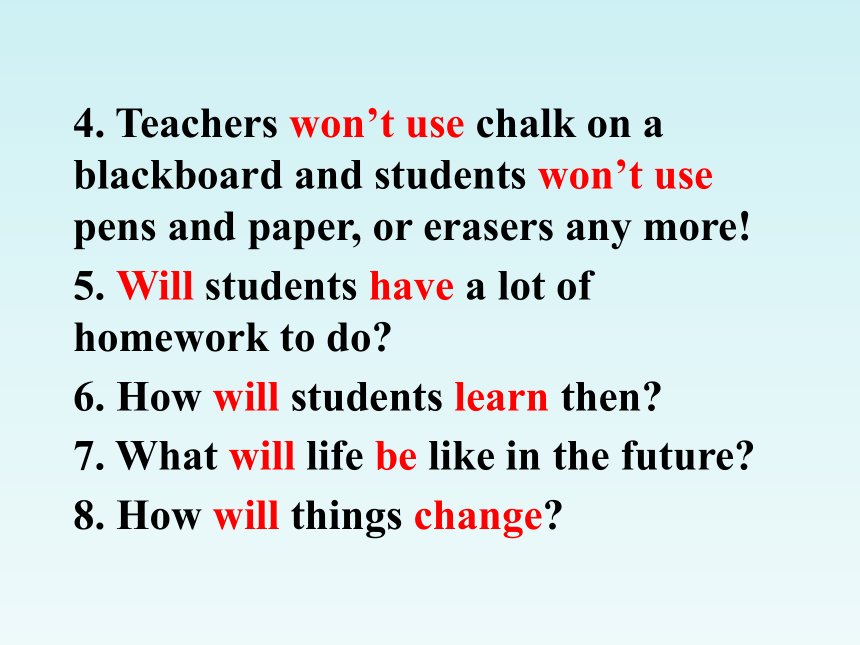
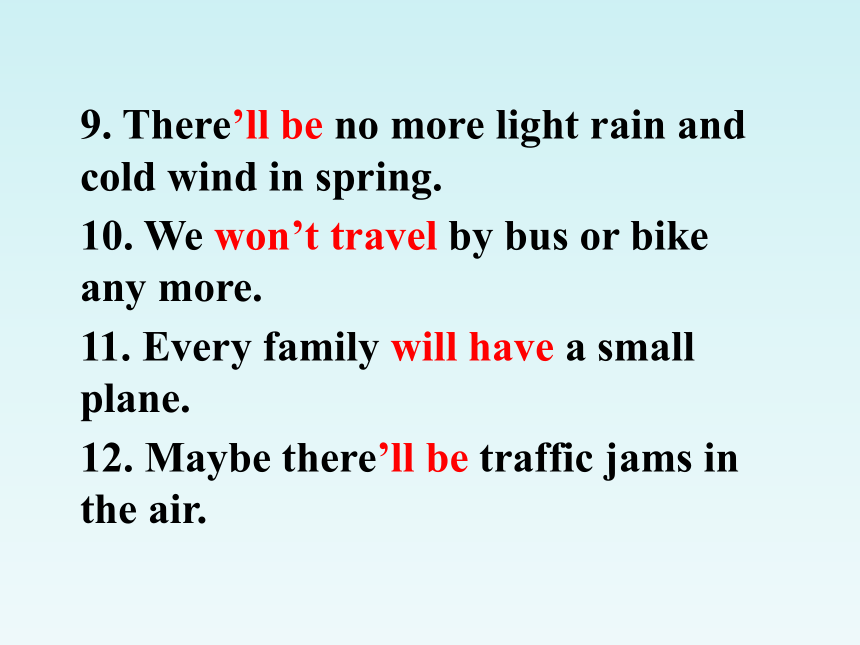
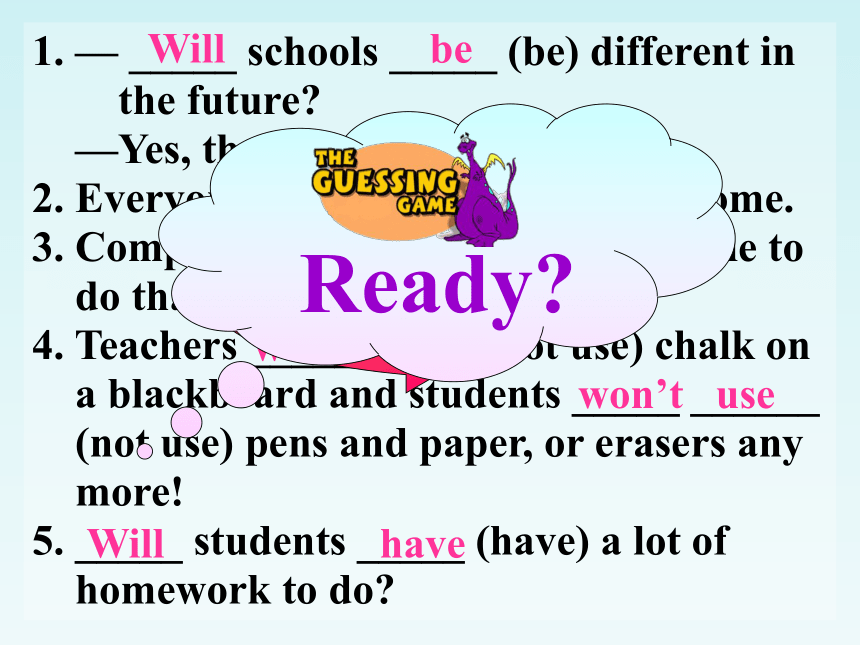
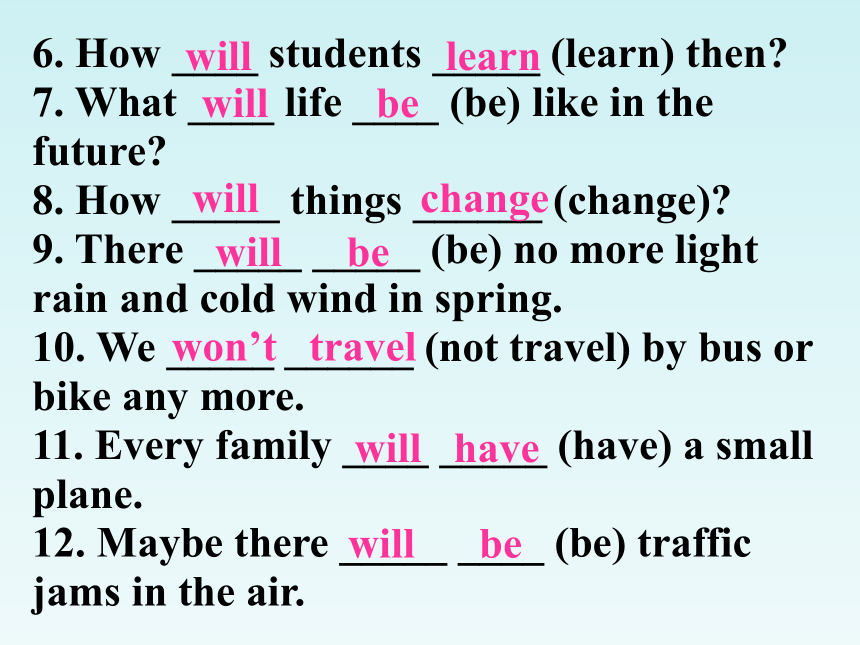

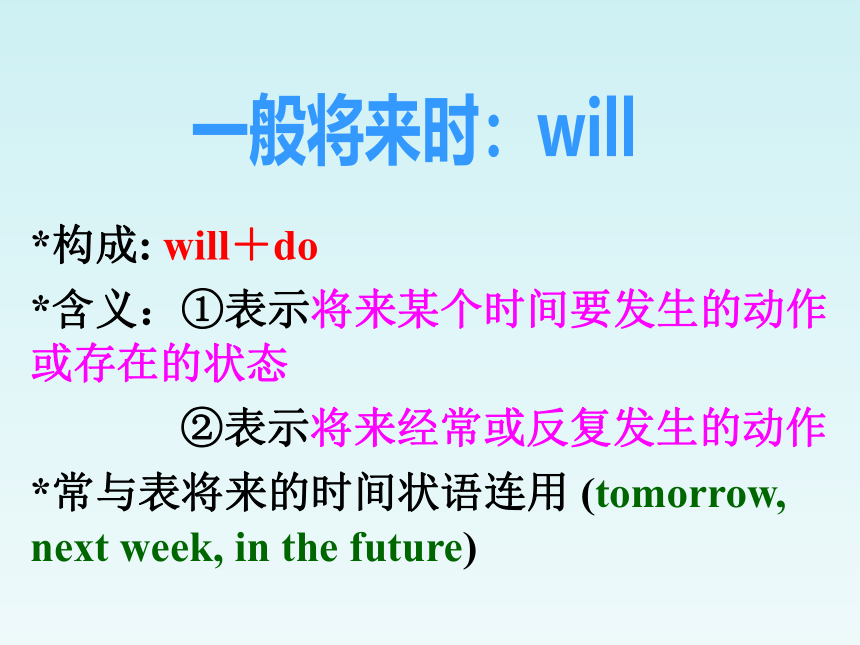
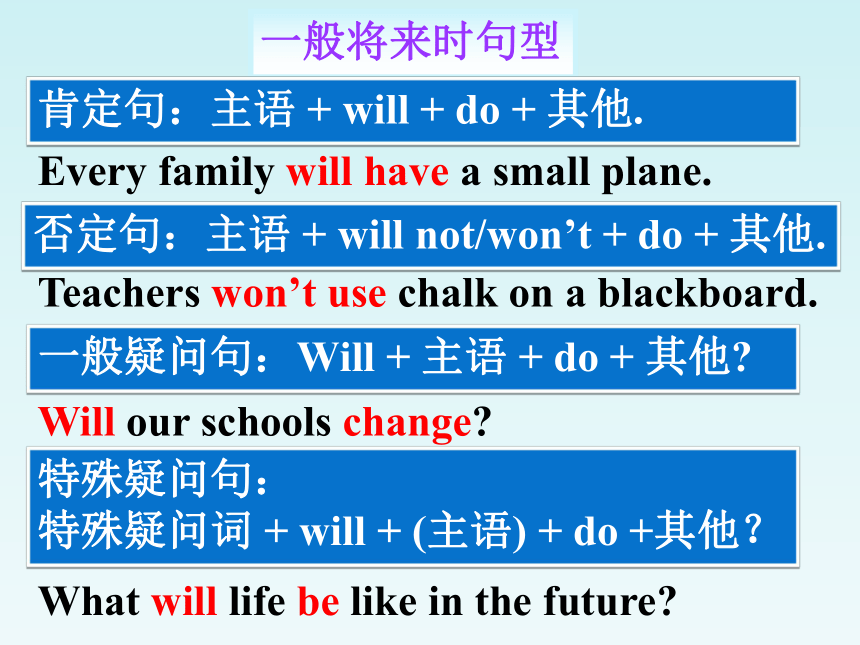
文档简介
(共34张PPT)
外研 七年级下
Module 4
Life in the future
Read the conversations and pay attention to the circled parts.
will+动词原形可以表示将来某个时间要发生的动作或存在的状态或将来经常或反复发生的动作,意为“将会,将要”。
1. To summarise and consolidate the use of will with the simple future tense
2. To learn the differences between “will” and “be going to”
Objectives
Observe the following sentences carefully. Pay attention to the red words.
—Will schools be different in the
future
—Yes, they will.
2. Everyone will study at home.
3. Computers won’t be able to do that.
4. Teachers won’t use chalk on a blackboard and students won’t use pens and paper, or erasers any more!
5. Will students have a lot of homework to do
6. How will students learn then
7. What will life be like in the future
8. How will things change
9. There’ll be no more light rain and cold wind in spring.
10. We won’t travel by bus or bike any more.
11. Every family will have a small plane.
12. Maybe there’ll be traffic jams in the air.
— _____ schools _____ (be) different in
the future
—Yes, they _____.
2. Everyone _____ _____ (study) at home.
3. Computers _____ _____ (not be) able to do that.
4. Teachers _____ _____ (not use) chalk on a blackboard and students _____ ______ (not use) pens and paper, or erasers any more!
5. _____ students _____ (have) a lot of homework to do
Will be
will
will study
won’t be
won’t use
won’t use
Will have
go
Ready
6. How ____ students _____ (learn) then
7. What ____ life ____ (be) like in the future
8. How _____ things ______ (change)
9. There _____ _____ (be) no more light rain and cold wind in spring.
10. We _____ ______ (not travel) by bus or bike any more.
11. Every family ____ _____ (have) a small plane.
12. Maybe there _____ ____ (be) traffic jams in the air.
will learn
will be
will change
will be
won’t travel
will have
will be
*构成: will+do
*含义:①表示将来某个时间要发生的动作或存在的状态
②表示将来经常或反复发生的动作
*常与表将来的时间状语连用 (tomorrow, next week, in the future)
Every family will have a small plane.
一般将来时句型
肯定句:主语 + will + do + 其他.
否定句:主语 + will not/won’t + do + 其他.
一般疑问句:Will + 主语 + do + 其他
Teachers won’t use chalk on a blackboard.
Will our schools change
特殊疑问句:
特殊疑问词 + will + (主语) + do +其他?
What will life be like in the future
1. Our schools will change.
(改为一般疑问句并作肯定回答)
--Will our schools change
--Yes, they will.
2. Students will carry lots of books to school.
(改为否定句)
Students won’t carry lots of books to school.
3. They will go on a summer camp in Sydney.
(对划线部分提问)
What will they do in Sydney
【 经典例句】
1. Maybe there’ll be traffic jams in the air.
2. In twenty years’ time, maybe there
won’t be any schools.
3. Will there be robots in our homes
in the future
4. —Will there be less pollution
—No, there won’t. / Yes, there will.
there be句型的一般将来时
“there be” 句型一般将来时的表达
*肯定句: There will be +名词(短语)
*否定句: There will not / won’t be +
名词(短语)
*一般疑问句:
--Will there be +名词(短语)
--Yes, there will. / No, there won’t.
肯定 否定 一般疑问 回答
I will … I will not/won’t … Will I … Yes, you will./ No, you won’t.
You will … You will not/won’t … Will you …
Yes, I will./ No, I won’t.
He/she/It will … He/She/It will not/won’t … Will he/ she/it … Yes, he/she/it will./ No, he/she/it won’t.
肯定 否定 一般疑问 回答
We will … We will not/won’t … Will we …
Yes, you will./
No, you won’t.
They will …
They will not/won’t …
Will they … Yes, they will./
No, they won’t.
There will be … There will not/won’t be … Will there be … Yes, there will./No, there won’t.
2. be going to表示根据主观判断将来肯定发生的事,will表示客观上将来势必发生的事。
1) This year is going to be very different because I’m going on a summer camp in Sydney, Australia.
2) He will be twenty years old.
1. be going to 有“计划,准备”的意思,而 will 则没有这个意思。
1) She is going to see a movie at the weekend.
2) They will have a lot of free time.
以下部分为课本练习,供老师在对答案时选择使用。
Complete the questions about the future.
1 _______________ (use) pens and papers 2 __________________ (read) books
3 ________________ (travel) by small plane
4 _________________ (send) emails to
teachers
______________ (go) to school in the future
Will students use
Will students go
Will students read
Will students send
Will people travel
1
P24
—Will students go to school in the future
—Yes, they will./ No, they won’t. They’ll study at home.
2
P24
Work in pairs. Ask and answer the questions in Activity 1.
Dialogue
Yes, they will.
Will + do
Pair work
Will students send emails to teachers
Dialogue
No, they won’t. They’ll use computers.
Will + do
Pair work
Will students use pens and paper in the future
Dialogue
Yes, they will. The science and technology developed a lot and people are getting more and more wealthy.
Will + do
Pair work
Will people travel by small planes in the future
Put the words in brackets in the correct place in the sentences.
1 People won’t have any jobs. (difficult)
2 Robots will do work on farms. (heavy)
3 People will have holidays. (long)
4 There will be rain this evening. (light)
People won’t have any difficult jobs.
Robots will do heavy work on farms.
3
People will have long holidays.
There will be light rain this evening.
P24
Weather
Computer
Job
Travel
heavy rain hot summer
warm winter wind
email Internet
heavy work interesting job
Check
small plane traffic jam
email heavy rain heavy work
hot summer interesting job Internet
small plane traffic jam warm winter wind
Put the words and expressions from the box into the correct columns.
4
P24
Think about life in the future. Write down your ideas.
* Schools
* Homes
* Travel
* Weather
5
Making a poster about life in the future in your home town.
P25
Work in groups of four. Talk about your ideas. Decide on five good ideas.
6
A: What will schools be like in the future
B: The teacher won’t write on a
blackboard …
C: How will our homes change
D: There will be more machines …
A: Will we find new ways to travel
B: Yes, we will. We’ll …
C: Will the weather change
D: Yes, it will. It will be …
P25
Make a poster. Include five of your good ideas.
7
Life in the future will be very different. We’ll …
P25
Possible answer
Life in the future will be very different. We’ll have robots to do everything. They will cook, and clean the house and drive buses. People will travel by plane a lot. Children will have a lot of free time. At school, we won’t have books or pens, and we won’t have teachers. We’ll learn from robots and the Internet. Working hours will be short and people will have long holidays. In the future, the weather will change. It will be hotter and there will be more rain. Life in the future will be very interesting!
一般将来时,将要发生的事。
谓语不一般,will 加动原,
要变疑问句,will提前面。
否定句,也不难,will后面添not。There be 句型要记住,will定在be之前。
语法总结
Quiz
Ⅰ. 根据汉语提示完成下列句子。
1. 下周我将会很忙。
I ______ ______ very busy next week.
2. 我的笔友明天会来看我。
My pen friend ______ ______ to see me
tomorrow.
3. —你今晚会帮助她学习汉语吗?
—是的,我会。/不,我不会。
— ______ you _______ her with her
Chinese
— Yes, ____ _____. / No, ___ ______.
will be
will come
Will help
I will
I won’t
Ⅱ. 句型转换。
1. Uncle Sam will buy a car in three years.
(改为一般疑问句)
_____ Uncle Sam _____ a car in three
years
2. Kids will go to school next week.
(改为否定句)
Kids _____ ____ to school next week.
3. Kitty will go swimming tomorrow
afternoon. (对划线部分提问)
______ ______ Kitty _____ tomorrow
afternoon
Will buy
won’t go
What will do
Homework
1. Make your own poster about life in the future in your home town.
2. Review the grammar we’ve learnt today.
3. Finish the exercises in Learning English.
外研 七年级下
Module 4
Life in the future
Read the conversations and pay attention to the circled parts.
will+动词原形可以表示将来某个时间要发生的动作或存在的状态或将来经常或反复发生的动作,意为“将会,将要”。
1. To summarise and consolidate the use of will with the simple future tense
2. To learn the differences between “will” and “be going to”
Objectives
Observe the following sentences carefully. Pay attention to the red words.
—Will schools be different in the
future
—Yes, they will.
2. Everyone will study at home.
3. Computers won’t be able to do that.
4. Teachers won’t use chalk on a blackboard and students won’t use pens and paper, or erasers any more!
5. Will students have a lot of homework to do
6. How will students learn then
7. What will life be like in the future
8. How will things change
9. There’ll be no more light rain and cold wind in spring.
10. We won’t travel by bus or bike any more.
11. Every family will have a small plane.
12. Maybe there’ll be traffic jams in the air.
— _____ schools _____ (be) different in
the future
—Yes, they _____.
2. Everyone _____ _____ (study) at home.
3. Computers _____ _____ (not be) able to do that.
4. Teachers _____ _____ (not use) chalk on a blackboard and students _____ ______ (not use) pens and paper, or erasers any more!
5. _____ students _____ (have) a lot of homework to do
Will be
will
will study
won’t be
won’t use
won’t use
Will have
go
Ready
6. How ____ students _____ (learn) then
7. What ____ life ____ (be) like in the future
8. How _____ things ______ (change)
9. There _____ _____ (be) no more light rain and cold wind in spring.
10. We _____ ______ (not travel) by bus or bike any more.
11. Every family ____ _____ (have) a small plane.
12. Maybe there _____ ____ (be) traffic jams in the air.
will learn
will be
will change
will be
won’t travel
will have
will be
*构成: will+do
*含义:①表示将来某个时间要发生的动作或存在的状态
②表示将来经常或反复发生的动作
*常与表将来的时间状语连用 (tomorrow, next week, in the future)
Every family will have a small plane.
一般将来时句型
肯定句:主语 + will + do + 其他.
否定句:主语 + will not/won’t + do + 其他.
一般疑问句:Will + 主语 + do + 其他
Teachers won’t use chalk on a blackboard.
Will our schools change
特殊疑问句:
特殊疑问词 + will + (主语) + do +其他?
What will life be like in the future
1. Our schools will change.
(改为一般疑问句并作肯定回答)
--Will our schools change
--Yes, they will.
2. Students will carry lots of books to school.
(改为否定句)
Students won’t carry lots of books to school.
3. They will go on a summer camp in Sydney.
(对划线部分提问)
What will they do in Sydney
【 经典例句】
1. Maybe there’ll be traffic jams in the air.
2. In twenty years’ time, maybe there
won’t be any schools.
3. Will there be robots in our homes
in the future
4. —Will there be less pollution
—No, there won’t. / Yes, there will.
there be句型的一般将来时
“there be” 句型一般将来时的表达
*肯定句: There will be +名词(短语)
*否定句: There will not / won’t be +
名词(短语)
*一般疑问句:
--Will there be +名词(短语)
--Yes, there will. / No, there won’t.
肯定 否定 一般疑问 回答
I will … I will not/won’t … Will I … Yes, you will./ No, you won’t.
You will … You will not/won’t … Will you …
Yes, I will./ No, I won’t.
He/she/It will … He/She/It will not/won’t … Will he/ she/it … Yes, he/she/it will./ No, he/she/it won’t.
肯定 否定 一般疑问 回答
We will … We will not/won’t … Will we …
Yes, you will./
No, you won’t.
They will …
They will not/won’t …
Will they … Yes, they will./
No, they won’t.
There will be … There will not/won’t be … Will there be … Yes, there will./No, there won’t.
2. be going to表示根据主观判断将来肯定发生的事,will表示客观上将来势必发生的事。
1) This year is going to be very different because I’m going on a summer camp in Sydney, Australia.
2) He will be twenty years old.
1. be going to 有“计划,准备”的意思,而 will 则没有这个意思。
1) She is going to see a movie at the weekend.
2) They will have a lot of free time.
以下部分为课本练习,供老师在对答案时选择使用。
Complete the questions about the future.
1 _______________ (use) pens and papers 2 __________________ (read) books
3 ________________ (travel) by small plane
4 _________________ (send) emails to
teachers
______________ (go) to school in the future
Will students use
Will students go
Will students read
Will students send
Will people travel
1
P24
—Will students go to school in the future
—Yes, they will./ No, they won’t. They’ll study at home.
2
P24
Work in pairs. Ask and answer the questions in Activity 1.
Dialogue
Yes, they will.
Will + do
Pair work
Will students send emails to teachers
Dialogue
No, they won’t. They’ll use computers.
Will + do
Pair work
Will students use pens and paper in the future
Dialogue
Yes, they will. The science and technology developed a lot and people are getting more and more wealthy.
Will + do
Pair work
Will people travel by small planes in the future
Put the words in brackets in the correct place in the sentences.
1 People won’t have any jobs. (difficult)
2 Robots will do work on farms. (heavy)
3 People will have holidays. (long)
4 There will be rain this evening. (light)
People won’t have any difficult jobs.
Robots will do heavy work on farms.
3
People will have long holidays.
There will be light rain this evening.
P24
Weather
Computer
Job
Travel
heavy rain hot summer
warm winter wind
email Internet
heavy work interesting job
Check
small plane traffic jam
email heavy rain heavy work
hot summer interesting job Internet
small plane traffic jam warm winter wind
Put the words and expressions from the box into the correct columns.
4
P24
Think about life in the future. Write down your ideas.
* Schools
* Homes
* Travel
* Weather
5
Making a poster about life in the future in your home town.
P25
Work in groups of four. Talk about your ideas. Decide on five good ideas.
6
A: What will schools be like in the future
B: The teacher won’t write on a
blackboard …
C: How will our homes change
D: There will be more machines …
A: Will we find new ways to travel
B: Yes, we will. We’ll …
C: Will the weather change
D: Yes, it will. It will be …
P25
Make a poster. Include five of your good ideas.
7
Life in the future will be very different. We’ll …
P25
Possible answer
Life in the future will be very different. We’ll have robots to do everything. They will cook, and clean the house and drive buses. People will travel by plane a lot. Children will have a lot of free time. At school, we won’t have books or pens, and we won’t have teachers. We’ll learn from robots and the Internet. Working hours will be short and people will have long holidays. In the future, the weather will change. It will be hotter and there will be more rain. Life in the future will be very interesting!
一般将来时,将要发生的事。
谓语不一般,will 加动原,
要变疑问句,will提前面。
否定句,也不难,will后面添not。There be 句型要记住,will定在be之前。
语法总结
Quiz
Ⅰ. 根据汉语提示完成下列句子。
1. 下周我将会很忙。
I ______ ______ very busy next week.
2. 我的笔友明天会来看我。
My pen friend ______ ______ to see me
tomorrow.
3. —你今晚会帮助她学习汉语吗?
—是的,我会。/不,我不会。
— ______ you _______ her with her
Chinese
— Yes, ____ _____. / No, ___ ______.
will be
will come
Will help
I will
I won’t
Ⅱ. 句型转换。
1. Uncle Sam will buy a car in three years.
(改为一般疑问句)
_____ Uncle Sam _____ a car in three
years
2. Kids will go to school next week.
(改为否定句)
Kids _____ ____ to school next week.
3. Kitty will go swimming tomorrow
afternoon. (对划线部分提问)
______ ______ Kitty _____ tomorrow
afternoon
Will buy
won’t go
What will do
Homework
1. Make your own poster about life in the future in your home town.
2. Review the grammar we’ve learnt today.
3. Finish the exercises in Learning English.
同课章节目录
- Module 1 Lost and found
- Unit 1 Whose bag is this?
- Unit 2 Are they yours?
- Unit 3 Language in use
- Module 2 What can you do ?
- Unit 1 I can play the piano
- Unit 2 I can run really fast
- Unit 3 Language in use
- Module 3 Making plans
- Unit 1 What are you going to do at the weekends?
- Unit 2 We're going to cheer the players.
- Unit 3 Language in use
- Module 4 Life in the future
- Unit 1 Everyone will study at home
- Unit 2 Every family will have a small plane.
- Unit 3 Language in use
- Module 5 Shopping
- Unit 1 What can I do for you?
- Unit 2 You can buy everything on the Internet
- Unit 3 Language in use
- Module 6 Around town
- Unit 1 Could you tell me how to get to the Nationa
- Unit 2 The London Eye is on your right.
- Unit 3 Language in use
- Revision module A
- Module 7 My past life
- Unit 1 I was born in a small village.
- Unit 2 I was born in Quincy.
- Unit 3 Language in use
- Module 8 Story time
- Unit 1 Once upon a time….
- Unit 2 Goldilocks hurried out of the house.
- Unit 3 Language in use
- Module 9 Life history
- Unit 1 He left school and began work at the age of
- Unit 2 He decided to be an actor.
- Unit 3 Language in use
- Module 10 A holiday journey
- Unit 1 What did you do?
- Unit 2 This morning we took a walk.
- Unit 3 Language in use
- Module 11 Body language
- Unit 1 They touch noses!
- Unit 2 Here are some ways to welcome them.
- Unit 3 Language in use
- Module 12 Western music
- Unit 1 It's so beautiful!
- Unit 2 Vienna is the centre of European classical
- Unit 3 Language in use
- Revision module B
